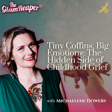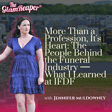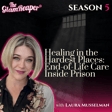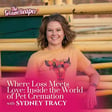
From Try Line to Lifeline: Brent Pope’s Journey Through Darkness and Healing
What if one small act of kindness could save a life?
In this deeply moving episode of The Glam Reaper Podcast, We sit down with Brent Pope—a former Rugby and TV pundit turned mental health advocate/super hero to many. Brent opens his heart about his own struggles with anxiety, depression, and grief, and how those battles inspired a global movement rooted in empathy. Through his “Elephant in the Room” project, he’s brought powerful symbols of hope into workplaces, schools, and communities—reminding people that it’s okay to not be okay, and even more okay to talk about it, especially coming from the world of sports.
This conversation isn’t just about mental health—it’s about being human. It’s about showing up for each other, meeting people where they are, and realizing that the most meaningful thing we can give someone is the feeling that they’re not alone.
Key Topics:
-Opening up about mental health struggles and finding healing
-The story behind the Elephant in the Room movement
-How small acts of kindness can truly make a difference
-Why time and connection matter more than anything
-Creating safe spaces for honest conversations and real care
Quotes from the episode:
“The connections that you make in your life—that's what's most important”
-Brent Pope
"Tomorrow is not guaranteed, so pick up the phone, send the damn text, live your life, take the trip—do whatever you can to make your life that marginally bit happier.”
-Jennifer Muldowney
Timestamp:
[00:00] Podcast Intro
[03:01] Brent Pope opened up about his mental health journey and deep passion for art, sharing how a powerful moment on a construction site sparked the idea for a movement.
[10:22] Reflecting on years of personal struggle and his path to becoming a psychotherapist, Brent explained how one honest conversation became the catalyst for a global effort to shift how we approach emotional support in workplaces and beyond.
[20:35] Brent highlighted that real change in mental health culture doesn’t start with policies—it starts with small, human moments of care, listening, and choosing to show up for one another.
[32:22] Speaking with raw honesty, Brent reminded us that healing begins with how we treat ourselves and the people around us—with empathy, presence, and the courage to connect.
[43:13] As the conversation came to a close, Brent urged listeners to stop waiting for “someday” and start living with intention—finding joy in the simple things and making time for what truly matters before it’s too late.
[46:52] Outro
Connect with Brent Pope:
LinkedIn- linkedin.com/in/brent-pope-93a0323b
Instagram -@popeapparel
X- @RealBrentPope
Connect with Jennifer/The Glam Reaper on socials at:
Instagram - https://www.instagram.com/jennifermuldowney/
TikTok - https://www.tiktok.com/@therealglamreaper
YouTube - https://www.youtube.com/@TheGlamReaperMuldowney
LinkedIn - https://www.linkedin.com/in/jennifermuldowney/
Facebook Page - https://www.facebook.com/MuldowneyMemorials/
Email us - glamreaperpodcast@gmail.com
Shop Merch - https://the-glam-reaper.printify.me/products
Listen to The Glam Reaper Podcast on Apple Podcasts:
https://podcasts.apple.com/us/podcast/the-glam-reaper-podcast/id1572382989?i=1000525524145
The Glam Reaper® AMAZON Storefront - https://amzn.to/4hObpOh



















